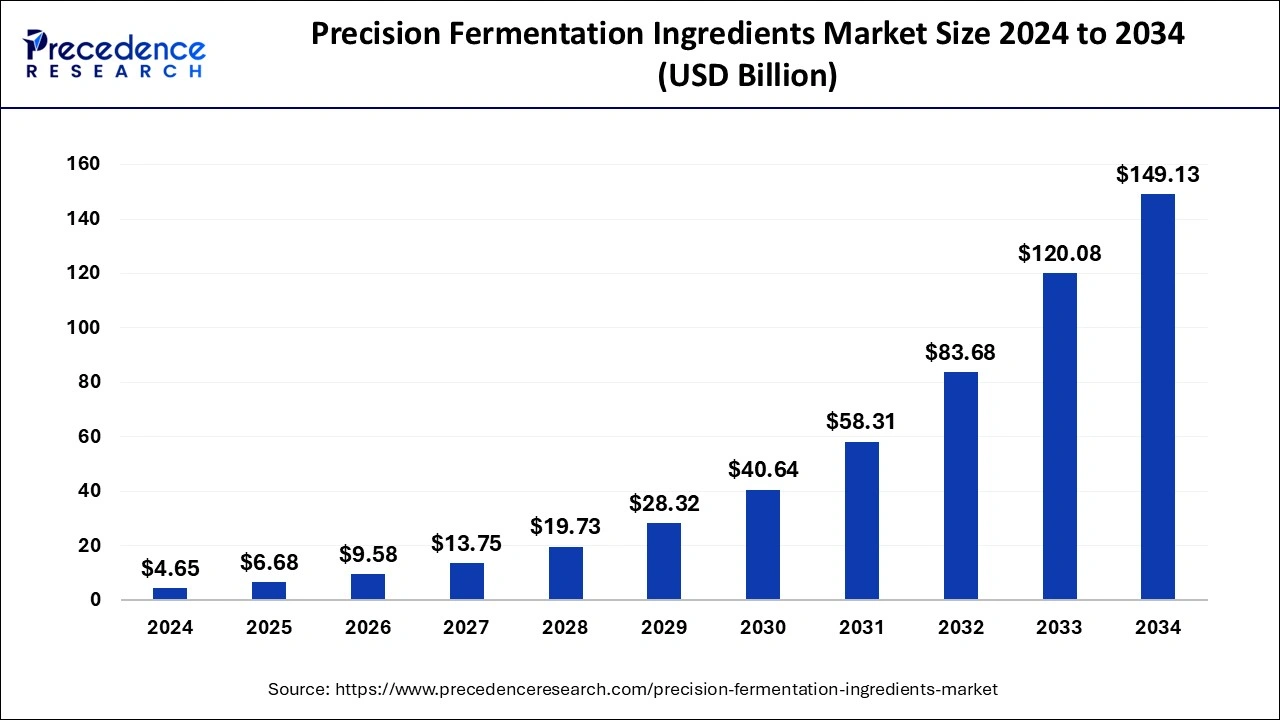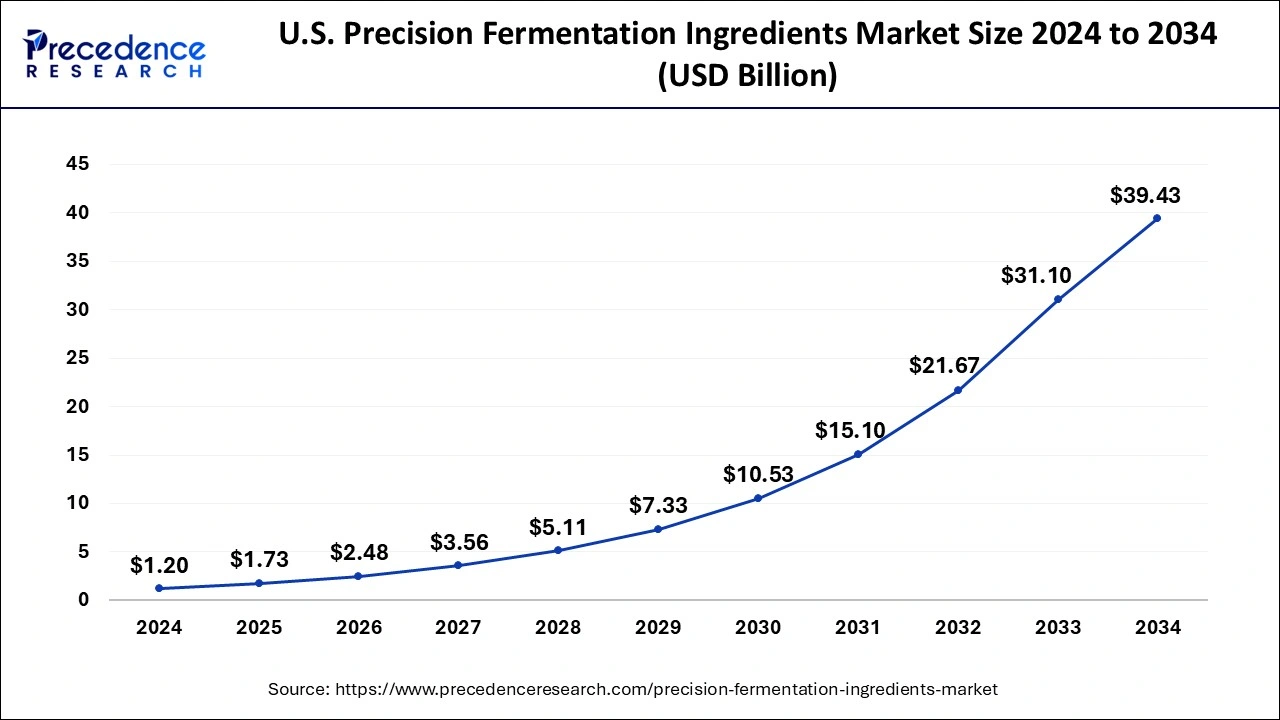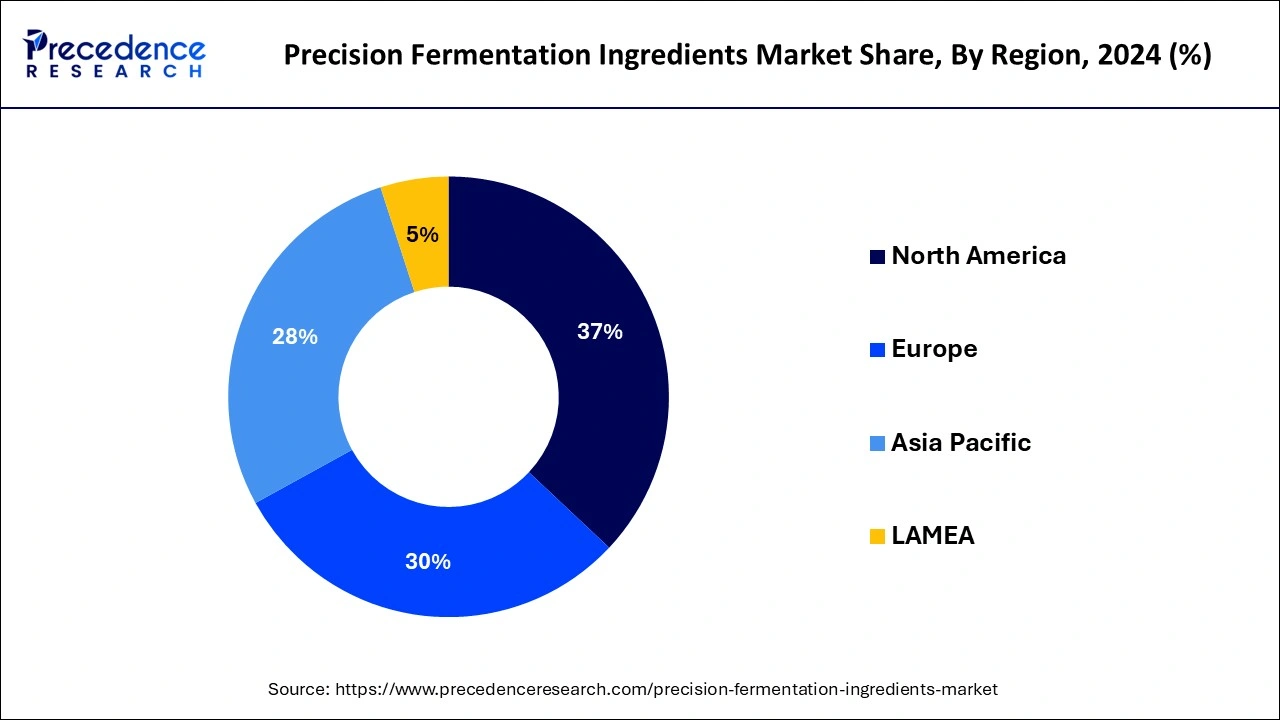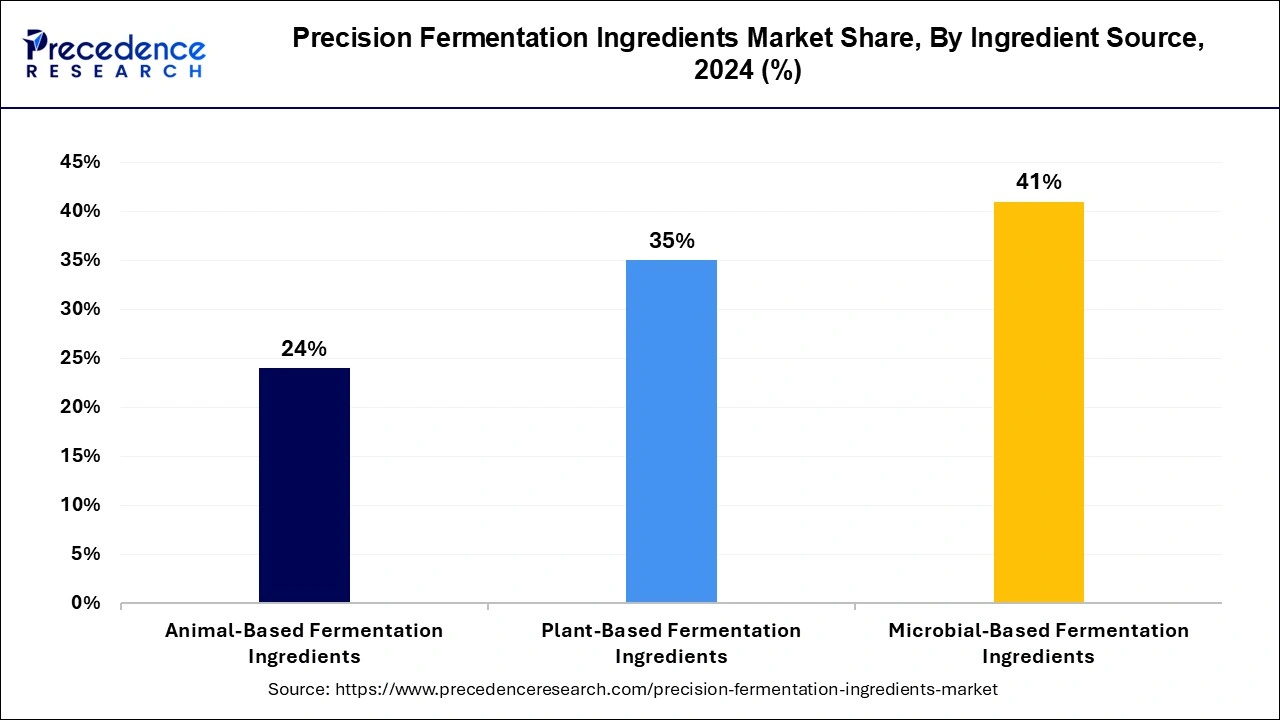December 2024
The global precision fermentation ingredients market size is calculated at USD 6.68 billion in 2025 and is forecasted to reach around USD 149.13 billion by 2034, accelerating at a CAGR of 41.45% from 2025 to 2034. The North America precision fermentation ingredients market size surpassed USD 1.72 billion in 2024 and is expanding at a CAGR of 41.65% during the forecast period. The market sizing and forecasts are revenue-based (USD Million/Billion), with 2024 as the base year.
The global precision fermentation ingredients market size was estimated at USD 4.65 billion in 2024 and is predicted to increase from USD 6.68 billion in 2025 to approximately USD 149.13 billion by 2034, expanding at a CAGR of 41.45% from 2025 to 2034. Primary reasons behind the growth of this market is a rising trend of veganism and people willing to diversify their dietary preferences.

The U.S. precision fermentation ingredients market size was estimated at USD 1.20 billion in 2024 and is predicted to be worth around USD 39.43 billion by 2034, at a CAGR of 41.80% from 2025 to 2034.

North America dominated the precision fermentation ingredients market. The U.S. dominated in North America. Fermentation is one of the important processes in several foods in the region. Research and development are highly advanced, and several biotech laboratories are working on making the process of precision fermentation more effective to produce more tasty and healthy food. Despite a lot of research, there is still a vast ocean left unexplored in the field of precision fermentation.
Microbes have a tremendous capacity to reproduce, and with proper end-product formulation and manufacturing, more developments can be made in the field of precision fermentation. The food and beverage industry is growing rapidly in the U.S., and several beverages, like yogurt, need to be fermented. The fermentation process needs to be regulated properly in order to ensure that all the packages of a particular food product taste the same.

Asia Pacific is the fastest-growing region in the precision fermentation ingredients market. Products similar in taste and texture to animal products are produced using fermentation technology. Fermentation technology is extremely beneficial because it is possible to generate several complex organic compounds without using animals. A rising popularity among people for plant-based protein products is driving this market forward in the region.
Precision fermentation is a process of using microbial hosts to produce particular end products. It is also called bacterial or microbial fermentation. Precision fermentation has a variety of uses in the food and pharmaceutical industries. Ingredients used in the process of precision fermentation are called precision fermentation ingredients. Precision fermentation consists of using genetically modified organisms to produce compounds like proteins, enzymes, and other important molecules. Precision fermentation is a cost-effective approach and is used for producing a wide variety of products, which might include plant-based meat and even drugs and vaccines.
Precision fermentation finds maximum applications in the food and pharma industry. Using precision fermentation, it is possible to produce food without soil or normal farming practices. Due to this, the sustainability of the production process increases, and it also opens up the possibility of producing more animal-free food, as there is less use of animal products. A regulated environment is provided for the growth of microorganisms that are beneficial while producing foods like vinegar, casein, protein products, dairy products, etc. Using this method, one can produce plant-based foods, protein, and even alternatives for eggs and meat. The advantage of precision fermentation is that a large amount of food can be produced using fewer resources. This helps in reducing greenhouse emissions.
Precision fermentation is a process of using microbial hosts to produce particular end products. The precision fermentation ingredients market is also useful in the pharmaceutical industry. It is used to produce recombinant proteins and bioconjugates. Mammalian cell culture showed popularity in the past, but now microbial fermentation is trending. Precision fermentation methods show a faster rate of development, higher yields, and better scalability.
| Report Coverage | Details |
| Growth Rate from 2025 to 2034 | CAGR of 41.45% |
| Global Market Size in 2025 | USD 6.68 Billion |
| Global Market Size by 2034 | USD 149.13 Billion |
| Largest Market | North America |
| Base Year | 2024 |
| Forecast Period | 2025 to 2034 |
| Segments Covered | By Product Type, By Ingredient Source, and By Application |
| Regions Covered | North America, Europe, Asia-Pacific, Latin America, and Middle East & Africa |
Developments in the food industry
Several advantages drive the precision fermentation ingredients market ahead. Food does not require a lot of resources to produce, and it can be produced in small rooms with the appropriate amount of resources and media, unlike conventional agricultural practices, where one needs a lot of space to grow crops or, in the case of livestock, to feed them.
In the precision fermentation ingredients market, even to produce a small quantity of meat, the animals need to be fed a lot of grass and water. So, in this case, the output is less than the input. Also, killing animals is strongly criticized by vegans or vegetarians, and some cultures and religions oppose this practice. However, precision fermentation opens the door for producing plant-based meat products, or mock meats, that can closely resemble the actual meat.
Scale up challenges
The precision fermentation ingredients market is difficult to scale up, and this will affect the precision ingredients market. Going from a small-scale laboratory to a large-scale production factory is challenging. While scaling up, it is important to maintain quality and productivity. The production costs for precision fermentation can be high, and sometimes, they can be higher than what one can get by conventional practices. Hence, it is not always cost-effective.
In the precision fermentation ingredients market, genetically modified organisms are used, which raises ethical and safety concerns. The safety of the proteins produced by precision fermentation should be ensured. As precision fermentation gets scaled up by a few companies, they might assert dominance over the other companies that are unable to scale up. Conventional farming practices would be affected, and this might cause farmers to suffer heavy losses.
Lucrative business opportunities
The precision fermentation ingredients market can solve the problem of food insecurity. There are drought-prone areas where agriculture is not possible through conventional methods. In such areas, labs can be set up, and using minimal resources, food can be produced. If conditions are not even appropriate to set up labs, the produced food can be transported, and that would still cost less than wasting money on a barren land for agriculture.
The yeast-based ingredients segment dominated the precision fermentation ingredients market in 2024. Yeast is a very important component in bakery items like cakes and beverages like beer, and it is also used in science labs as a medium for growing bacterial colonies. Because they are versatile, yeast-based ingredients are dominant. The production of yeast-based products is efficient and fast, and one can get proteins, enzymes, and many other products in a good yield. They are safe to consume, and food regulation authorities approve them. Hence, it has gained popularity and importance in the food and pharmaceutical industry. Yeast-based ingredients and products are rich in amino acids and proteins. Hence, this is also used to make nutritional supplements.
The proteins segment is predicted to be the fastest-growing segment during the forecast period. People understand the importance of proteins in their diet, as proteins are the building blocks of our body and have various functions to perform. People prefer foods high in protein content and low in carbohydrates or sugar. Many foods don't offer this, and one has to look for other protein-rich sources. Plant proteins are in high demand, and by precision fermentation, we can produce high-quality plant proteins. Protein production can also become more specific and can be customized; for example, we can either produce chemicals for therapeutic uses or proteins for providing nutrition in specific domains of health.
The microbial-based fermentation ingredients segment held the dominant share of the precision fermentation ingredients market in 2024. A wide variety of microorganisms like bacteria, yeast, or fungi can be used to produce proteins and vitamins. Their production is easy to scale up and hence meet the high industrial demands. They also show high efficiency and are found to be cost-effective. There are several technological advancements in the biotech industry, and this has further improved the precision fermentation ingredients market. Microbial fermentation is more cost-effective than other methods of fermentation.

The plant-based fermentation ingredients segment is expected to grow at a notable rate during the forecast period. Several religions and communities prefer vegetarianism or veganism to stop cruelty against animals, or their body might not be able to digest meat. There are several plant-based alternatives for such people. Veganism is trending these days, as famous celebrities like Virat Kohli are also going vegan, and it sets up an example among the people who idolize such celebrities. Hence, as vegetarianism and veganism grow, plant-based fermentation ingredient sales will also grow in the precision fermentation ingredients market.
The food & beverages segment dominated the precision fermentation ingredients market in 2024. Significant advancements in genetic engineering have made it possible to reprogram microorganisms in a cost-effective and sustainable way through precision fermentation. This process, also known as synthetic biology, allows for the creation of a variety of specialized food protein constituents. As more people turn towards vegan food options, manufacturers have introduced a range of egg alternatives. These alternatives, derived from precision fermentation, are useful in baking, cooking, and food formulation, making them a popular choice for sustainable consumption. Precision fermentation has also been linked to sustainability, reducing greenhouse gas emissions, promoting natural farming, and encouraging sustainable packaging, making it an innovative solution for the future.
By Product Type
By Ingredient Source
By Application
By Geography
For inquiries regarding discounts, bulk purchases, or customization requests, please contact us at sales@precedenceresearch.com
No cookie-cutter, only authentic analysis – take the 1st step to become a Precedence Research client
December 2024
March 2025
December 2024
October 2024